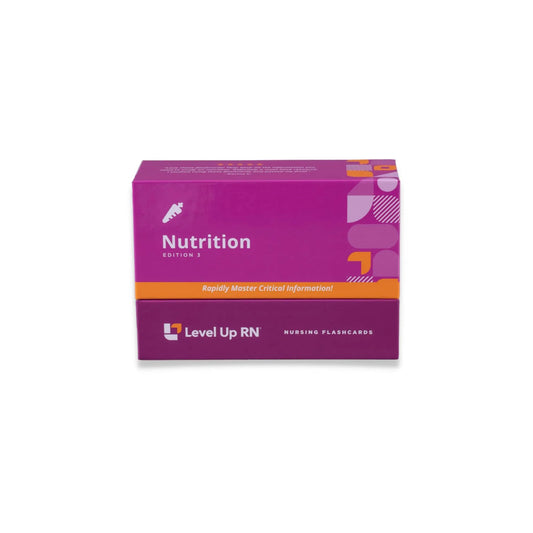Hi, I'm Cathy with Level Up RN. In this video, I'm going to continue my coverage of topics from our Level Up RN nutrition flashcard deck. Specifically, I'll be talking about nutritional and activity guidelines for adults as well as best practices for losing weight. And then at the end of the video, I'm going to give you guys a quiz to test your understanding of some of the key points I'll be covering. So definitely stay tuned for that. And if you have our flashcards, go ahead and pull them out so you can follow along with me and pay close attention to the bold red text on the back of the cards because those are the things that you are likely to get tested on in nursing school.
Per the CDC's Dietary Guidelines for Adults, the core elements of a nutrient-dense, healthy diet include a variety of vegetables, fruits, especially whole fruits, grains with an emphasis on whole grains, protein such as lean meat, poultry, eggs, and legumes, and low-fat or fat-free dairy, or alternatively, fortified soy beverages and yogurt. One tool that's available to help people choose the right amount of each food group is MyPlate, which is published by the USDA. With MyPlate, 50% of the plate should consist of vegetables and fruit; 25% should consist of protein; and 25% should consist of grains. And then a serving of dairy is included as well. In terms of foods and beverages that should be limited or avoided, trans fats should be avoided, and then saturated fats should be limited to under 10% of daily calories or under 7% to further reduce the risk of heart disease. Sodium intake should be limited to under 2,300 milligrams per day, and added sugar should be less than 10% of daily calories. And then alcohol consumption should be limited to one drink per day or less for women and two drinks per day or less for men.
Moving on to physical activity guidelines now. Per the CDC, adults should engage in 150 minutes per week of moderate aerobic activity, such as brisk walking, or 75 minutes per week of vigorous aerobic activity, such as running. In addition, adults should engage in muscle-strengthening activities like weightlifting at least two days per week. And this helps to increase bone strength as well as muscle mass and decreases the risk for osteoporosis.
Let's now talk a little bit about weight loss. So one thing I would definitely know is that 3,500 calories equals a pound. So if someone wanted to lose one pound per week, they could reduce their daily calories by 500. So 500 calories times seven days a week equals 3,500 calories. To lose weight in a healthy way, the CDC has a number of recommendations. This includes setting realistic goals that are specific but also forgiving of setbacks. They also recommend keeping a food diary, which helps to make you more aware of what you eat or drink. Getting support can be very helpful, such as joining a weight-loss support group. And then it's important to plan meals ahead of time in order to improve food choices. And you also want to address any unhealthy eating habits, such as eating too fast or eating when not hungry. And then you want to monitor your weight on a regular basis so you can adjust your eating or exercise plan accordingly. And getting physical activity on a daily basis is also important.
All right. It's quiz time, and I've got four questions for you. Question number one: Alcohol intake should be limited to blank drinks per day or less for men, and blank drinks per day or less for women.
The answer is two for men and one for women.
Question number two: With the MyPlate tool, how much of the plate should consist of vegetables and fruits?
The answer is 50%.
Question number three: Per the CDC, adults should engage in blank minutes per week of moderate aerobic activity or blank minutes per week of vigorous aerobic activity.
The answer is 150 minutes per week of moderate aerobic activity and 75 minutes per week of vigorous aerobic activity.
Question number four: If a patient wants to lose one pound a week, their daily caloric intake should be reduced by blank calories.
The answer is 500 calories. So 500 calories times seven days a week equals 3,500 calories, which is the equivalent of one pound.
All right. That's it for this video. I hope it was helpful. Thank you so much for watching, and good luck with studying.
And one drink a day.


